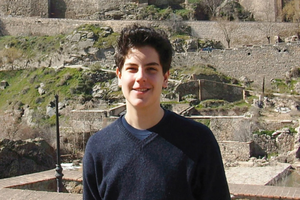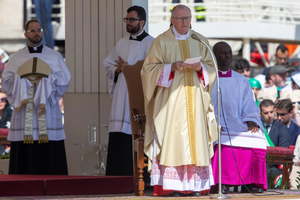Hadley Arkes: Only Natural Law Can Revitalize the Pro-Life Cause
The Catholic intellectual says the growing taboo in the West against challenging ‘abortion rights’ is due to a failure to emphasize the ethical foundation of the debate.

The pro-life cause has undoubtedly lost ground in the political battles of the last two years in the United States and in other Western nations — but why has this been the case?
For American professor Hadley Arkes, a leading intellectual figure in the pro-life movement, one major reason is because many abortion opponents have allowed the debate to focus not on the nature of the human embryo — and therefore on the intrinsic illegitimacy of abortion — but rather on legal considerations that judge abortion’s validity only by its constitutionality.
The remedy, according to Arkes — a legal philosopher who is the founder and director of the James Wilson Institute on Natural Rights and the American Founding, a think tank based in Alexandria, Virginia, named for an American Founding Father and legal scholar — America is to reclaim the terms of the debate by returning it closer to the tenets of natural law, a set of rights governed by universal principles that each person possesses by their very human nature and not by their individual will or the evolution of customs.
Arkes has consistently based his intellectual work in defense of life on this legal and philosophical approach, to which he has dedicated several books — among them Mere Natural Law Originalism and the Anchoring Truths of the Constitution (2023), First Things (1986) and Natural Rights & the Right to Choose (2002).
“Founding Father James Wilson, after whom I named my institute, used to ask: ‘If we have natural rights, when do they begin?’ His answer was: ‘As soon as we begin to be,’ which is why he said the common law casts its protection over human life from ‘the first stirring in the womb.’”
Drawn to the Church
It was precisely Arkes’ work on natural law that led this political scientist of Jewish origin to embrace the Catholic faith in 2010. Born in 1940 and raised in an Orthodox Jewish family, he was rooted in the faith of his ancestors throughout his youth.
As his profound vocation for the defense of life blossomed in the 1970s, the lack of sensitivity to this cause in his community in Amherst, Massachusetts, led him to forge new intellectual and friendly connections with Catholics, as he told the Register at the time of his conversion.
He thus struck up close friendships with several Catholic thinkers, among them Daniel Robinson, Antonin Scalia, Robert George and later with philosopher Michael Novak, a trusted adviser to President Ronald Reagan.
“It really made a difference that the Church was the one institution sustaining the moral reasoning of natural law,” he added, pointing out that he wasn’t originally pro-life out of religiosity, but that it was precisely the power of the Catholic moral argument in defense of the sanctity of life from its embryonic stage that convinced him of the veracity of the faith professed by the Church.
The ‘Disaster’ of Dobbs
The architect of the 2002 Born-Alive Infants Protection Act, Arkes has observed a considerable loss of ground in pro-life advocacy across the political spectrum in recent decades.
Ironically, he sees the pro-life movement’s greatest victory in the last half-century — the U.S. Supreme Court’s overturning of Roe v. Wade in its 2022 Dobbs decision — as a setback for the cause for life.
“Dobbs has been a disaster in so many ways,” Arkes said in an interview the Register.
Interpreted by the Western political and media world as a worrying “step backwards” for women’s rights, the decision has subsequently given rise to a series of measures designed to strengthen and extend the scope of “abortion rights” in various European countries and institutions.
For example, Poland, whose Constitutional Court had severely restricted “abortion rights” in 2020, saw a strong political comeback by the nation’s progressive coalition in autumn 2023. Several analysts attributed this victory specifically to a counteroffensive by abortion supporters, citing the unprecedented mobilization of women in last year’s parliamentary elections.
A similar backlash in the U.S. has an upsurge in the number of abortions performed across the country and a radicalization of pro-abortion rhetoric that has been fully embraced by the Biden administration and the Democratic Party’s nominee for the presidency, Vice President Kamala Harris.
At the same time, Harris’ Republican opponent, former president Donald Trump, whose court appointees made the Dobbs majority possible, has adopted a more centrist position, preferring to leave the abortion issue in the hands of the states while vowing to veto a national 15-week abortion ban and advocating for taxpayer-funded in vitro fertilization (IVF) coverage nationwide.
In Arkes’ view, this state of affairs is the result of 50 years of a cultural crusade against the pro-life cause, which has caused most Western conservatives to lose sight of the moral substance of the abortion issue, which goes far beyond Dobbs’ legal considerations. The decision was in fact founded exclusively on the constitutionality of this practice, without considering the intrinsic human nature of embryos.
“It has become evident that most people have not had 10 minutes of serious conversation about this issue — about the grounds of recognizing that even that zygote or embryo is the same entity as that baby who is going to emerge in nine months at the end of this process [of pregnancy],” he told the Register.
The same applies, he added, to IVF, which the Catholic Church condemns. Trump and other conservatives in the U.S. and Europe support IVF politically, without a thought for the fate of “extra” embryos created in the process.
To support such a practice, said Arkes, is to ignore the fact that the fertilized ovum is “exactly what it was in its first stage, with all the genetic material that will define it for the rest of its life.”
The professor thus concluded that natural law, rejected by the elites of the law schools since the end of the 19th century, remains the indispensable keystone for restoring a correct apprehension of life-related ethical issues in the collective conscience — for, ultimately, the one and only question to be asked about abortion, as with IVF, “is not what an embryo looks like at a given moment, but what it is.”
- Keywords:
- dignity of the human person
- church teaching on human reproduction
- born-alive infants protection act
- born alive protection act
















